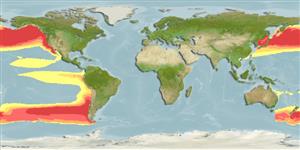Common names from other countries
>
Scombriformes (Mackerels) >
Caristiidae (Manefishes)
Etymology: Caristius: Name presumably named after Carystus, a demi-god of Greek mythology.; macropus: macropus meaning large foot (Ref. 6885).
Environment: milieu / climate zone / depth range / distribution range
Ecologia
marino batipelagico; distribuzione batimetrica 200 - 1450 m (Ref. 87086). Deep-water; 66°N -
North Pacific: from subtropical waters to the Bering Sea and the coast of Alaska to where it is apparently drifted by warm currents.
Size / Peso / Age
Maturity: Lm ? range ? - ? cm
Max length : 32.0 cm TL maschio/sesso non determinato; (Ref. 2850)
Spine dorsali (totale): 0; Raggi dorsali molli (totale): 32-36; Spine anali 0; Raggi anali molli: 21 - 23; Vertebre: 37 - 40. This species is distinguished from C. meridionalis by having fewer dorsal-fin rays (32-36 vs. 35-39); distal half of gill rakers with several short bristles, occasionally a small bristle at the tip (vs. several long bristles on distal half of raker and 1-2 long bristles extending from the tip of each raker); and morphology of dorsal pharyngeal papillae (low folds vs. fleshy tabs and small papillae); differs from C. fasciatus by having greater number of smaller teeth and vertebral count ajd the absence of a fingerlike papilla inside the opercle (sometimes absent in C. fasciatus); differs from C. digitus by the absence of a series of fingerlike papillae inside the opercle, having a short conical pharyngeal teeth (vs. elongate pharyngeal teeth), and fewer gill rakers (18-22 vs. 22-26) (Ref. 94277).
Occurs in midwaters in temperate latitudes. Fish remains have been found in manefish stomachs (Ref. 4525). From fry catches, it apparently reproduces in the subtropical zone (Ref. 95096).
Life cycle and mating behavior
Maturità | Riproduzione | Deposizione | Uova | Fecundity | Larve
Stevenson, D.E. and C.P. Kenaley, 2013. Revision of the manefish genera Caristius and Platyberyx (Teleostei: Percomorpha: Caristiidae), with description of five new species. Copeia 2013(3):415-434. (Ref. 94277)
IUCN Red List Status (Ref. 130435)
CITES (Ref. 128078)
Not Evaluated
Threat to humans
Harmless
Human uses
Warning: mysqli::__construct(): (HY000/1040): Too many connections in /var/www/html/includes/func_getlabel.php on line 46
Can't connect to MySQL database (fbapp). Errorcode: Too many connections
